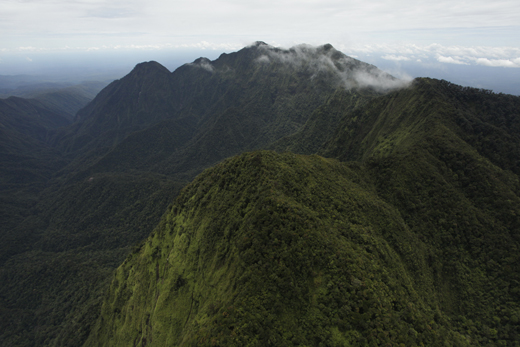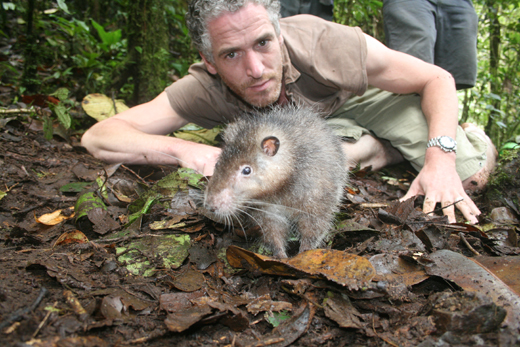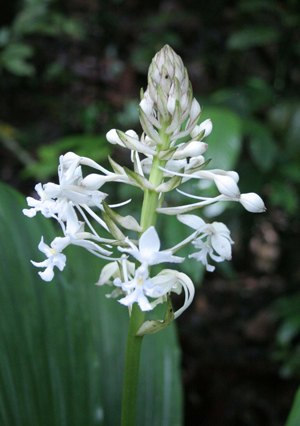Papua New Guinea: Lost world uncovered by BBC team
14/09/09
A team of experts assembled by the BBC Natural History Unit, and led by Dr. George McGavin of Oxford University, spent six weeks of 2009 exploring an extinct volcano in Papua New Guinea (PNG) where they discovered an ancient treasure trove of natural history including giant rats and one of the world's smallest parrots.
The lost world threw up a sensational array of plants and animals living in the dense forest - many of which had never been described by science. But the mission carried with them a deeper set of objectives. By charting the life in the forest and by raising the profile of the unique inhabitants the team hoped to press the government to ensure the loggers don’t creep any closer. Currently 20 miles away and advancing - taking with them plants and animals that may be lost before they are ever described – this is a battle that should and could be won.

The slopes of Mount Bosavi are cloaked in ancient forest / BBC
Papua New Guinea’s forests, which have an estimated 16,000 species of plants, of which over 100 genera are endemic, are under severe pressure. Rapid population growth of over 3 per cent per year is forcing people into virgin territory to farm, timber firms continue their march into the pristine with the omnipresent oil palm plantations following on behind. The shocking truth of the logging enterprise was revealed by PNG’s Minister for Forests, Beiden Namah, in 2008 when he estimated 98 per cent of the timber was bound for China.

Wildlife cameraman Gordon Buchanan with the brave and
tentatively named "Bosavi Wooly Rat" from the genus Mallomys / BBC
Satellite monitoring has given us a fairly good idea of deforestation over the years, as Plant Talk reported last year, and the reading isn’t pretty. In 1972 approximately 82 per cent of the forest was intact, falling to 71 per cent in 2002. At current rates about 53 per cent of the forests will be lost or badly damaged by 2020. With less and less forest available for logging in Malaysia and Indonesia, PNG has been the next easy target. As ever, political will is required to break the cycle and in 1975 environmental issues were added to the government’s political agenda that seemed assured to safe-guard this rich natural heritage. The Fourth National Goal, which states: “Natural resources and environment are to be conserved for the collective benefit of the future generations” looks good on paper, but significantly less solid on the ground.
 On the western side of the island of New Guinea things are little better. The Indonesian colonies of Papua and West Papua - where numerous human rights offences are alleged to be ongoing - face a fight against metaphorical environmental abuses too.
On the western side of the island of New Guinea things are little better. The Indonesian colonies of Papua and West Papua - where numerous human rights offences are alleged to be ongoing - face a fight against metaphorical environmental abuses too.
High profile broadcasting like the BBC mission is a valuable weapon to add to the armoury of conservationists all over the world. But, we must be careful to not bring biological elitism or auditing into the conservation equation too much. It’s possible to imagine situations where we only value habitat because of the number of rare organisms present; after all there are many other reasons to value a landscape. Sheer diversity is important but not absolute.
An orchid found on the slopes of Mount Bosavi by the BBC team
Keep coming back for more news and pictures of these amazing finds.